


This past Friday news spread quickly throughout the world that the Gadol HaDor, Rav Chaim Kanievsky, zt”l was niftar. From his humble two-bedroom apartment at 23 Rechov Rashbam, Rav Chaim toiled in Torah for decades, and met with hundreds of thousands of people seeking his guidance and psak on the weightiest matters. Additionally, Rav Chaim was known as a “baal mofes,” someone whose brachos became true real-life miracles. I’d like to share a personal story about Rav Chaim, and to attempt to understand who he was and what we lost.
Before the passing of Rav Chaim’s father, the Steipler Gaon, Rav Chaim had a relatively low profile. That is the way his father told him to live. Not to be a rosh yeshiva nor a rosh lollel despite the many offers. He spent his days and nights plummeting the depths of the entire gamut of Torah. Yet way before Rav Chaim became known as the “Sar HaTorah,” he already knew and understood Kol Hatorah Kulah and had published seforim that left the Torah world in awe.
When Rav Chaim was 20 years old he published a sefer called Kiryas Melech. The sefer went through all of the Rambams in Yad Hachazaka that commentaries were left wondering what the Rambam’s source was. The Maggid Mishna, Lechem Mishna and other commentaries simply did not know where the Rambam got his psak from. In Kiryas Melech Rav Chaim finds sources for all these Rambams. Whether it be from Bavli, Yerushalmi or an obscure mechilta, Rav Chaim was able to find a source. At the young age of 20 (and probably before) Rav Chaim had learned and understood every single part of Kol Hatorah Kulah. And he continued to learn with extraordinary hasmadah for the rest of his life.
Two-and-a-half years ago I spent Sukkot in Eretz Yisroel. After the Yom Tov, I took a trip to Bnei Brak with a prominent rav from Yerushalayim to get a bracha from Rav Chaim. I had been dating for a number of years and perhaps a bracha from Rav Chaim would be helpful. Needless to say, the lines went way out into the streets as people waited to receive their blessing from Rav Chaim. The rav I was with used some “protekzia,” and I was able to skip the line and get right into Rav Chaim’s room. After a few minutes I got a seat at the table. Rav Chaim was told that I wanted a bracha for shidduchim. Rav Chaim responded, “Tilmod Kiddushin”—learn Masechet Kiddushin. It was typical for Rav Chaim to advise people to learn a mesechta related to the issue they were dealing with. But my acquaintance persisted and told Rav Chaim in Yiddish, “He wants a bracha as well.” At that moment Rav Chaim looked up into my eyes and uttered one word—“B’karov” (it will happen soon). We picked ourselves up and left the apartment and drove back to Yerushalayim.
The rest of the story is predictable. A few months later I met the girl who would become my wife. A few months after that we were engaged and a few months later we got married. My aufruf was exactly one year from the day I received the bracha from Rav Chaim. My wedding was three days after that. There is no doubt in my mind that this was a fulfillment of “tzadik gozer, Hakadosh Baruch Hu mikayim.” When a tzadik decrees something, Hashem will make sure it happens. I am not the only one—there are thousands of stories like this.
Chazal tell us that the death of tzadikim is equivalent to the burning of the Beis Hamikdash. When we cry over the churban on Tisha B’Av, part of our tears is that we do not understand what the Beis Hamikdash means. We don’t understand the void in our lives. We don’t understand what it means to have the Kohanim do the avodah and for the shechinah to be present in this world. And that itself is a reason to cry. When we mourn the death of Rav Chaim, part of the mourning is that we do not understand what we lost. We don’t understand the level of learning Rav Chaim achieved. We don’t understand the tzidkas (righteousness) that Rav Chaim embodied. And we don’t know how many countless people Rav Chaim helped and the burdens that he carried for them. He was otherworldly, a malach that lived in our world.
Make no mistake, Rav Chaim was not “one of the leaders of our generation” or “one of the preeminent Torah scholars in the world.” Rav Chaim was the Gadol Hador—the greatest of the generation. This was the consensus of Torah Jews throughout the world regardless of their hashkafic orientation. Chassidish, Modern Orthodox, Yeshivish or Dati Leumi—everyone turned their eyes to Rav Chaim as the Torah leader of the world.
It will be impossible to completely fill this void left in the Torah world. Rav Chaim’s legacy is one of unending hasmada and commitment to Torah learning on the highest and most intense levels. He carried the burdens of klal Yisroel for so many years. Now it is our turn to do a little more in Torah, tefillah and gemilas chassadim to try to carry his legacy further.
Moshe Genack is a maggid shiur in Heichal Hatorah Beis Medrash and the assistant rabbi of Congregation Shomrei Emunah in Englewood.









